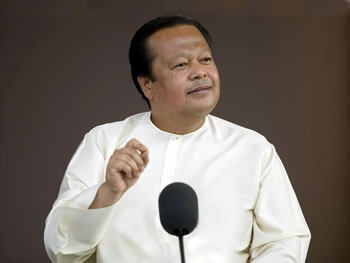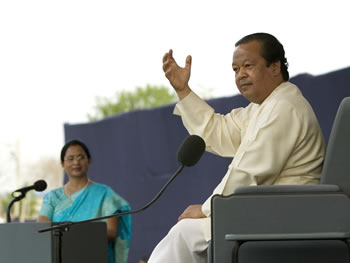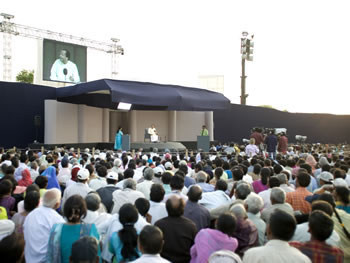Joy Is Possible

Maharaji started by reminding the audience that, as long as we do not experience a satisfaction that quenches our inner thirst for contentment, questions will keep coming to us. Hence the first priority is to quench our thirst. Each breath that comes and goes, he said, is a gift. He described the human body as a boat to get across an ocean of doubts and illusion. He described the role of a teacher as someone who helps guide this boat across to the other side—a difficult task which the right teacher can render easy.
 Knowledge, he reminded the audience, is a subject that is beyond the comprehension of the mind. This can be a hard concept to grasp, since the mind is the only tool we have to make sense of things. No label can be put on Knowledge, he said. All a person can do is experience it for themselves through the techniques which Maharaji shows. Knowledge, he reminded the audience, is a subject that is beyond the comprehension of the mind. This can be a hard concept to grasp, since the mind is the only tool we have to make sense of things. No label can be put on Knowledge, he said. All a person can do is experience it for themselves through the techniques which Maharaji shows.
To a question from a person asking him how to get hold of the joy in every breath, Maharaji explained that Knowledge is needed. Knowledge is what allows us to catch this joy. This is not a joy that can be thought about, he said; it is a joy to be witnessed, to be felt.
The difficulty in doing so, he said, is that we have bad habits: We are used to looking on the outside for what we need. When it comes to looking for joy, we think it is on the outside, too, and that's where we look for it. We like to think that joy and peace are far from us. We like to point at them as if they were in the future or in some remote, distant place. All we need to do, he said, is remove the curtain. It is just like a person who wakes up in the morning, opens the curtain to let light come in, and then can see what is inside the room.
To a question from a person wanting to know the difference between real joy and salvation, he said that, with Knowledge, a person gets joy from a place within where there is everything. When that place is reached, a person experiences a deep joy that is a door to salvation.
 To a question about whether Knowledge helps a person worry less, he replied that what matters is not so much whether one worries, but what one worries about. There are good worries, he said, like worrying about finding joy within or catching joy in each breath. Human beings worry, and we can link our worrying with pain or joy. To a question about whether Knowledge helps a person worry less, he replied that what matters is not so much whether one worries, but what one worries about. There are good worries, he said, like worrying about finding joy within or catching joy in each breath. Human beings worry, and we can link our worrying with pain or joy.
To another person who asked whether it would be advisable to relinquish all worldly possessions and responsibilities to dedicate himself to experiencing this Knowledge, Maharaji replied by emphasizing the importance of taking care of worldly responsibilities and of the even greater importance of remembering our most fundamental responsibility. Our fundamental responsibility, he said, is to fulfill the purpose for which we have been given this life. As to whether it was advisable to be a recluse, he said that he was not able to answer this question since he was neither a recluse nor a hermit. Maharaji explained that all he had done was recognize something beautiful within himself and surrender to that. To find joy, he said, it is not necessary to be a recluse.
 A person who said he was a devout follower of his religion asked Maharaji about how to have an experience within, something he said he had not been able to get from his religion. Maharaji likened Knowledge to water. The experience that we are looking for is within, he said, and the teacher can help put our hand on the glass that holds the water we are looking for—the glass from which we can drink and experience the water. Until that time, we only know that there is water. With Knowledge, we can put our hand on the glass and drink. A person who said he was a devout follower of his religion asked Maharaji about how to have an experience within, something he said he had not been able to get from his religion. Maharaji likened Knowledge to water. The experience that we are looking for is within, he said, and the teacher can help put our hand on the glass that holds the water we are looking for—the glass from which we can drink and experience the water. Until that time, we only know that there is water. With Knowledge, we can put our hand on the glass and drink.
The next question came from a person who said he was “neither educated nor intelligent.” He said that he had realized that he had many flaws and wondered if someone like him could learn this Knowledge. Maharaji replied that no one could be more intelligent than a person who recognizes his flaws. He asked this person not to belittle himself. Often, Maharaji said, the more people are educated, the less educated they are. He told the person that he had everything he needed, and that if he wanted joy in his life, this was possible, too.
|

